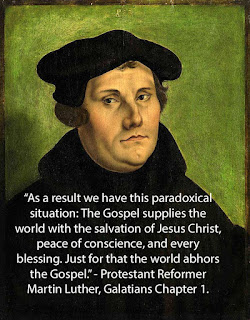The Gospel & The Reformation
This weekend has had a lesser known holiday attached to it, Reformation Day. Reformation Day remembers the recovery of the Gospel of Jesus Christ. While it would be hard for many today to imagine, there was a time when access to the Bible itself was limited. In the time of Martin Luther, many did not read the Bible (1483-1546). Even monks who did, often did so only for initiation for a time and then would not read it again. Common church members were often prevented from having the Bible in their native tongue. Untold millions lived under such a neglect of the Word of God.
In time it came about that certain key figures rediscovered the Scripture. They risked their life and safety to read it, translate it, and distribute it in common language. They spent much time in it themselves. From this came the findings of people like Martin Luther. He realized that despite his many good deeds, and religious observations, and trusting other good people, yet God would not accept him. Heaven was not available either. Luther came to realize that the Bible taught salvation is a gift, a free gift. It is grace, undeserved favor or merit. One cannot earn salvation. One must trust personally in Jesus as Savior instead.
Luther's own reading of the Psalms and the Book of Romans helped him in this realization. Part of this was personal reading and part of it was teaching a small German University in Theology (1507 onward). He was also part of a movement to return to original documents and languages in Europe. Bible translation was more easily possible because of this same movement. Others like the figure Erasmus were working in the languages, for instance. "Ad fontes" was a saying of the time which captures some of this. The work of all of these individuals made possible accurate translation and interest in it, to get the Bible to people where they could understand it. In vast areas of Europe, to even have a copy of the Bible in one's native tongue was a crime. So this was a bold act of faith. So was sharing the Gospel in native languages of the people. These were, believe it or not, risky things to do in that era.
For Reformer Martin Luther, the rediscovery that salvation is by grace alone through faith alone opened up his eyes. He had longed for assurance of salvation and God's love. Through hearing the Bible itself, in his studies, God had done a work in Luther's own heart and mind. Luther had real saving faith (Psalm 51; Romans 8:1). At first this was a fairly personal and local matter for he and others. Today Luther is known to have nailed the 95 Theses to the door of the Wittenberg Castle Church door. However, at the time that was a fairly mundane act. Church doors in that time served as a kind of community wide bulletin board, where debates, and local events, were advertised as part of regular life. So it is likely that Luther had hoped that some friendly college debate may happen, and probably not much more. Instead, these statements were famously copied and printed and spread around the region. This struck at the false doctrine, tradition, and decadence of the RC at the time. This invoked an unexpected and much larger debate that he had planned. In a short period of time, Luther was leading a larger movement than he had ever guessed. It flowed out of; however, his own discovery of how to be saved and how simply faith in Jesus Christ was required (Romans 10:9, 13).
The eventual result was (skipping over much for brevity sake) the Protestant Church movement of today. This movement was protesting abuses and overreaches of the Roman Catholic Church. Initially the early figures in this movement's goal was to remain RC. However, they were under threat of life and harm and the debate was heated by various persons out of their control. This movement had cast off contradictory dictates of traditions in the RC, in favor of an approach of Scripture alone as sufficient for spiritual life and salvation (2nd Timothy 3:16-17).
As a result of the light and heat generated by the new movement, fairly quickly, the professor and preacher, the figure Martin Luther, was forced into hiding for safety. Others were too. But regional political and business leaders protected them and furthered the movement, in God's providence. The Gospel of salvation by faith alone spread like wildfire because of the need and hunger for the truth. God blessed the Gospel going forth from humble beginnings. Many heard of the truth of salvation in Jesus for the first time in pamphlets and by local heralds and local pulpits exposed to the true Gospel (Romans 5:1). It was truth on fire.
If we may do something from reflecting on Reformation Day 2020, it is to be grateful we can hear of how to be saved (faith comes by hearing, Romans 10), and be saved (Romans 10). It is to also be aware we must stand for, advocate for, and not give up the right to freedom of worship, speech, and assembly (John 8) in our time. These work in tandem with the power of the Word of God declared to save us and those we may reach. To God be the glory.

Comments